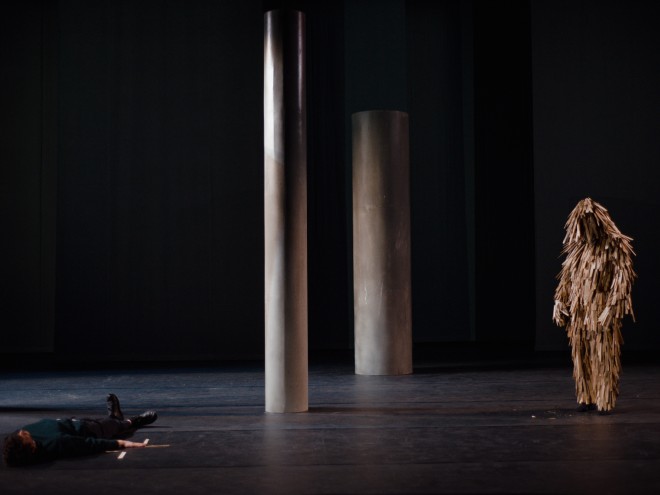
"Bosse Provoost did not make it easy on himself. Undeterred by the impossibility of staging or embodying the hermetic language of Paul Celan – a Jewish Romanian poet whose work is steeped in the Shoah – he deliberately avoided a classical approach. In response to Paul Celan and his contre-parole* – the language of resistance and power, an ultimate answer to the silence of history and an indictment of the German culture that resulted in the Shoah – Bosse Provoost presents an equally radical theatrical vision. Bosse Provoost by no means attempts to perform this death-drenched poetry comprised of fragments, snippets, monosyllables, silences and disappearances. Rather, he ingeniously stages the failure of its simply impossible incarnation – the powerlessness of the actor in the face of this poetry, a black star that resists all interpretation. Thus it is the scenography that conveys the questions posed by this fragile and insurmountable poetry; the scenography as a large reservoir of images in which the actor, liberated from the word and himself part of this process, is no longer the centre of the production but merely one of its elements, a part of the context. Technique, materials, movement, light, sound, space and actors form a whole, a global environment, an ecosystem loaded with meaning and subtle connections, permeated by silence.
An extreme, strict stylization: a few high shafts as crematoriums, in front of which we see the aphasia of a disabled actor…. That suffices for Breathturn, an evocation of the Shoah. Other images, enigmatic, symbolic, also emerge. Occasionally the actors recite a few lines, stubbornly attempting to force a breakthrough with such fragments several times before giving up. Rather than illustrate the text, Bosse Provoost attempts to present the mental experience it offers – that which poetry reveals beyond language, far removed from any formalism or naturalism – to look for the dark or even unconscious side of Paul Celan. In his own way, Bosse Provoost is a surrealist. The production is at once extremely austere, demanding, without concessions and of great purity."
* ‘A contre-parole is the poetic word of one who is obliged to write in the language of those who have murdered one’s parents and people, and who therefore must re-appropriate this language in the double light of one’s regained poetic integrity and a consciously displayed Jewish identity.’ – John E. Jackson
Denis Sanglard in Un Fauteuil pour L’Orchestre
← Back to overview